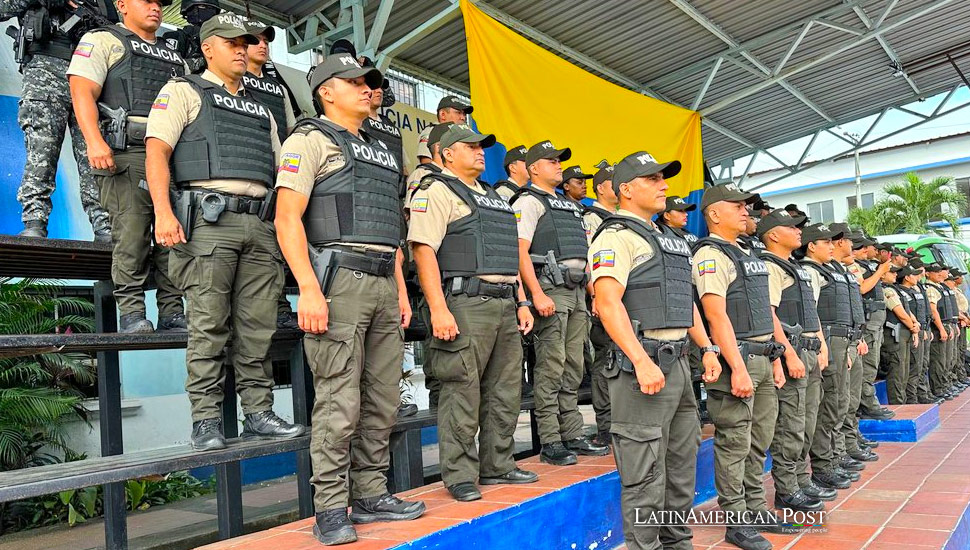Ecuador’s Massive Police Operation Strikes at Organized Crime

A major police operation in Ecuador’s Manabí province targeted extortion, child pornography, and drug trafficking, resulting in 27 arrests. The raid highlights the ongoing struggle against organized crime in the region.
In a sweeping operation against organized crime, Ecuadorian authorities carried out a massive raid in the coastal province of Manabí, targeting extortion, child pornography, and drug trafficking. This high-profile crackdown resulted in 27 arrests and underscored the government’s intensified efforts to combat the escalating violence and criminal activity plaguing the nation.
The operation, conducted in the city of Manta, followed a weekend marred by violence, where three individuals were killed in a shooting while attending a circus. President Daniel Noboa ordered the temporary relocation of police and military command to Manta to stabilize the situation.
The raids, encompassing 26 locations, were part of a broader government initiative aimed at curbing crime rates related to kidnappings, extortion, contract killings, murders, firearm possession, and drug trafficking. The operation’s results were significant: authorities seized three firearms, 3,480 grams of drugs, two motorcycles, and 15 mobile phones and recovered two vehicles. Over 400 police and military personnel participated, focusing on areas identified through crime index analysis as having high incidences of criminal activities, such as Cuba, Ceibos, Renacer, Montecristi, La Pradera, Villa Marina, and Rocafuerte.
The violence in Ecuador has escalated sharply in recent years, transforming the country into one of the most violent in the region, with a homicide rate of 45 per 100,000 inhabitants in 2023. This surge in violence is attributed to the growing influence of organized crime and gang activity, often linked to drug trafficking and other illicit enterprises.
Historical and Regional Perspective
Latin America has long struggled with high levels of crime and violence, often exacerbated by socioeconomic disparities, weak governance, and corruption. Countries like Mexico, Colombia, and Brazil have faced similar challenges, where powerful drug cartels and criminal gangs have undermined state authority and fueled cycles of violence.
Ecuador’s current situation mirrors these regional trends. Historically, Ecuador was considered relatively peaceful compared to its neighbors. However, the country’s strategic location along major drug trafficking routes has made it an attractive base for organized crime. The rapid escalation in violence can be traced back to the early 2000s, with the increased presence of international drug cartels and the proliferation of local gangs.
Government’s Response and Challenges
President Noboa’s administration has declared an “internal armed conflict” against criminal gangs, which the government now refers to as “terrorists.” This declaration reflects the severity of the crisis and the government’s determination to regain control. The recent operation in Manta is part of the broader “Plan Fénix,” aimed at restoring order in the country’s prisons, many of which are dominated by rival gangs. Since 2020, over 450 inmates have been killed in a series of prison massacres, highlighting the dire situation within the penal system.
The violence has spilled over into the streets, prompting a series of government actions to combat crime. Despite these efforts, the scale of the challenge remains daunting. Criminal organizations have deep roots and significant resources, making them formidable adversaries for the state. The successful execution of large-scale operations like the one in Manta demonstrates the government’s capability but also underscores the persistent and pervasive nature of the problem.
In addition to the Manta raids, a concurrent operation in the Andean region resulted in the arrest of eight individuals allegedly linked to the criminal group “Los Lobos.” These suspects were involved in drug trafficking and storage, as revealed by a police operation named “Holocausto.” The operation was based on meticulous investigative work, including analysis, interception, and telephone surveillance, which led to the successful apprehension of the suspects in Cayambe, Calderón, and Tumbaco.
The police confiscated 4,077 grams of marijuana, 1,623 grams of cocaine, a firearm, ammunition, 12 cell phones, scales, and cash. These seizures highlight the extensive reach of organized crime in Ecuador and the diversity of their illicit activities.
The Human Impact and Community Response
The human toll of Ecuador’s crime wave is profound. Families and communities often encounter the crossfire, experiencing loss, fear, and disruption. The impact on daily life is significant, with businesses, education, and social activities affected by the pervasive threat of violence.
Community leaders and civil society organizations have called for comprehensive strategies beyond law enforcement. They advocate for social programs addressing the root causes of crime, such as poverty, lack of education, and limited economic opportunities. These initiatives are essential for creating long-term stability and reducing the appeal of criminal enterprises.
The fight against organized crime in Ecuador also requires regional cooperation. Criminal networks operate across borders, necessitating coordinated efforts among Latin American countries. Ecuador has been working with neighboring countries and international organizations to share intelligence, strengthen border controls, and disrupt drug trafficking routes.
International support is crucial in this context. Organizations like the United Nations and Interpol can provide technical assistance, training, and resources to bolster Ecuador’s law enforcement capabilities. Moreover, addressing global drug demand and trafficking requires collaborative efforts involving consumer countries, particularly in North America and Europe.
Sustaining the Fight Against Crime
Ecuador’s government faces the ongoing challenge of sustaining its efforts against organized crime. The recent operations demonstrate a proactive approach, but the path ahead is fraught with obstacles. Effective governance, transparency, and public trust are essential to a successful strategy.
Long-term solutions must include judicial and police reforms to ensure accountability and effectiveness. Enhancing the legal framework to tackle organized crime, improving prison conditions, and providing adequate training and resources for law enforcement are critical steps.
Additionally, fostering economic development and social inclusion can help undermine the allure of criminal organizations. By creating opportunities for young people and marginalized communities, the government can reduce the socioeconomic factors that drive individuals towards crime.
The massive police operation in Manabí province, resulting in significant arrests and seizures, marks a critical moment in Ecuador’s ongoing battle against organized crime. This initiative is part of a broader strategy to curb violence and restore order in a country increasingly besieged by criminal activities.
The situation in Ecuador reflects a broader regional struggle with crime and governance. The lessons learned and strategies implemented here can serve as valuable examples for other Latin American countries facing similar challenges. By combining robust law enforcement with comprehensive social programs and international cooperation, Ecuador can work towards a safer and more stable future.
Also read: Ecuador’s New State of Emergency: A Bold Move to Combat Crime
As the government continues its efforts, the support and resilience of the Ecuadorian people will be vital. Together, they can confront the challenges posed by organized crime and build a society where safety and justice prevail.





